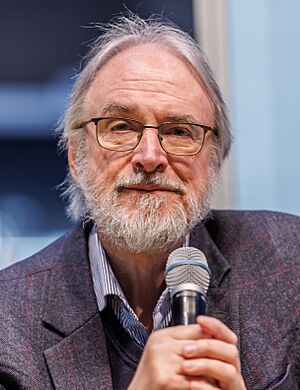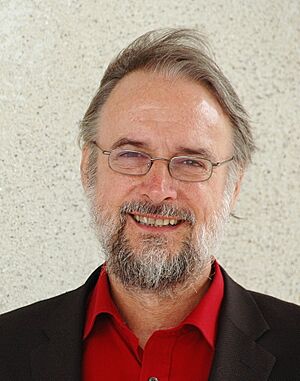Karlheinz Brandenburg facts for kids
Quick facts for kids
Karlheinz Brandenburg
|
|
|---|---|

Brandenburg in 2025
|
|
| Born | 20 June 1954 |
| Alma mater | University of Erlangen-Nuremberg |
| Known for | MP3 format |
| Awards | IEEE Masaru Ibuka Consumer Electronics Award |
| Scientific career | |
| Fields | Computer science |
| Institutions | Fraunhofer Society, Technische Universität Ilmenau |
Karlheinz Brandenburg (born June 20, 1954) is a German electrical engineer and mathematician. He is famous for helping to create the MP3 format. This format changed how we listen to music by making audio files much smaller. Because of his important work, many people call him the "father of the MP3."
Brandenburg also did important work in other areas. These include how we measure sound and how our brains hear sound (called psychoacoustics). He has won many awards for his research. Since 2000, he has been a professor at the Technical University Ilmenau. He also helps lead the Fraunhofer Institute for Digital Media Technology (IDMT).
Contents
Karlheinz Brandenburg's Early Life and Education
Karlheinz Brandenburg studied at Erlangen University. He earned degrees in Electrical Engineering in 1980 and Mathematics in 1982. In 1989, he earned his PhD in Electrical Engineering. His research was about how to make digital audio files smaller and how to measure how people hear sound.
His professor, Dieter Seitzer, was an expert in psychoacoustics. This is the study of how sound affects our minds. Professor Seitzer had an idea for a "digital jukebox" in the early 1980s. He imagined a system where people could get music from a central computer using phone lines.
The Challenge of Digital Music
Playing music from a CD uses a lot of digital information. About 1.4 million bits of data are needed for just one second of stereo music. The phone lines available at the time, called ISDN, could not send that much data fast enough. To make the "digital jukebox" work, the music files needed to be made almost 12 times smaller.
Professor Seitzer had tried to get a patent for his idea, but it was turned down. The patent office said what he wanted to do was "impossible." So, he asked Karlheinz Brandenburg to find out if it really was possible to make audio files that much smaller.
At first, Brandenburg thought it might be impossible too. But as he studied the problem more, he realized that such a large amount of compression might actually be possible.
Creating the MP3 Format
The research Brandenburg did for his PhD became the foundation for the MP3 format. It also helped create other modern audio compression methods. An international group called MPEG (Moving Picture Experts Group) worked to make MP3 an official international standard. This meant that MP3 could be used by everyone around the world.
From 1989 to 1990, Brandenburg worked in the U.S. on audio compression. In 1990, he returned to Germany. In 1993, he became the head of the Audio/Multimedia department at the Fraunhofer Institute for Integrated Circuits. Since 2000, he has been a full professor at the Technical University of Ilmenau. He also directs the Fraunhofer Institute for Digital Media Technology.
Brandenburg is a respected member of the Audio Engineering Society (AES). He has also helped create 27 U.S. patents.
Awards and Honors
Karlheinz Brandenburg has received many awards for his groundbreaking work. Here are some of them:
- 2023: He received the SMPTE Digital Processing Medal for his important work in developing digital audio compression systems like MP3.
- 2015: He won the Technology Award of the Eduard Rhein Foundation for his work on audio technology.
- 2014: He received the IMTC Leadership Award for his contributions to audio coding and making MP3 a standard. He also received an honorary PhD from the Polytechnic University of Valencia.
- 2014: He was chosen for the Internet Hall of Fame. This was because of his important role in creating the MP3 format and how it helped the internet grow.
- 2011: He was a "Distinguished Heyser memorial lecturer" at a big AES meeting.
- 2009: He received an honorary PhD from Leuphana University of Lüneburg for his role in developing the MP3 format. He was also chosen for the "German Research Hall of Fame."
- 2008: He received an honorary PhD from the University Koblenz-Landau for his excellent research in audio coding.
- 2007: He was chosen for the "CE Hall of Fame" by the Consumer Electronics Association for developing and spreading the MP3 format.
- 2006: He was chosen for the "Hall of Fame" of important inventors in electrical engineering. He also received the Cross of Merit on Ribbon from Germany.
- 2004: He received the IEEE Masaru Ibuka Consumer Electronics Award for his major contributions to digital audio coding.
- 2003: He won the Publications Award of the Audio Engineering Society for the best paper of the year.
- 2001: He received the German Internet Award NEO for his work on the MP3 format.
- 2000: He received the IEEE Engineering Excellence Award. He also won the Deutscher Zukunftspreis, a top German award for technology and innovation.
- 1998: He received the Silver Medal Award from the Audio Engineering Society for his ongoing contributions to audio coding.
- 1996: He received the Bavarian Innovation Award from the Bavarian State Government.
- 1994: He received the AES Fellowship Award for his important work in audio coders and psychoacoustics.
See also
- German inventors and discoverers
- How Music Got Free
 | Calvin Brent |
 | Walter T. Bailey |
 | Martha Cassell Thompson |
 | Alberta Jeannette Cassell |


